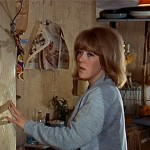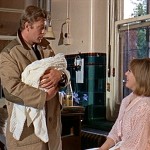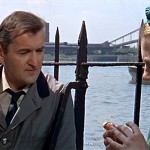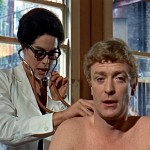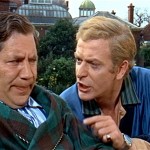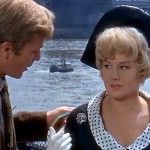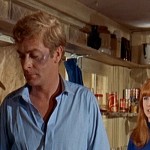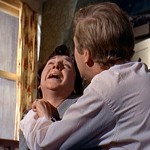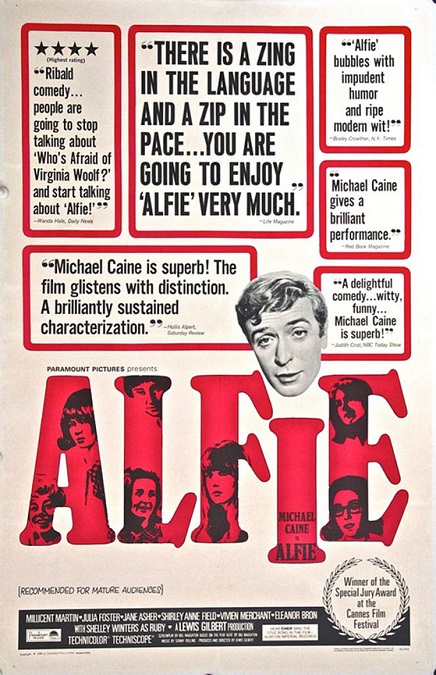
Alfie – 1966
Alfie was a quirky little movie which starred Michael Caine as the title character, Alfie. The movie’s message can be summed up pretty quickly. Don’t be a playboy or a womanizer, or you will end up like Alfie: lonely, sad, and emotionally unfulfilled. That’s it in a nutshell. Alfie was a narcissistic jerk who treated women cruelly and ruined their lives. But he was apparently so charming that no woman could resist him. I would scoff, but I know that there are actually people like that in the world.
First of all, it is important to note a story telling device that was employed by the director of the film, Lewis Gilbert, which was to allow Alfie to break the fourth wall and speak directly to the audience, which I am perfectly OK with for several reasons. First, he did it consistently throughout the entire film. Second, Alfie was the only character who did it. And third, it never interfered with the other characters in any way. In fact, others would often interrupt his inner monologues and he would pause to respond to them before continuing.
It was really a great part of the film’s charm, allowing you to see inside Alfie’s head and hear his thoughts. And Michael Caine did a great job with the unusual format. In fact, he actually was charming, despite his insensitive treatment of women. I don’t think I would have had any reason to like his character if the movie hadn’t been presented him that way.
Alfie was a cheeky British man with a strong Cockney accent. He had a habit of calling women ‘birds’, saying “With a bird, you can never tell where it’s been or what it’s done,” to which the man he was talking with, Harry Clamcraft, played by Alfie Bass, replied, “Would you mind saying ‘she’? You’re talking about my wife.” Then Alfie quipped, “She or it, they’re all birds.”
But then, during that same conversation, something was said which seemed to encapsulate one of the biggest themes of the movie. Alfie said, “I never wanted to hurt you, Harry. I never want to hurt anybody.” Harry responds by saying, “No, I suppose not. But you do, Alfie. You do.” But even then, the fact fails to sink in, and before you know it, he is back to his old tricks.
Alfie then proceeds to seduce Harry’s wife and get her pregnant, which leads to an abortion and Alfie’s cathartic event. The illegal abortion is carried out by a shady man in Alfie’s flat. He induces a miscarriage and leaves before the dead child is birthed. Alfie walks in and sees the aborted fetus and breaks down in tears. Only then does he begin to realize that his selfish ways are hurting people. Bud does he cry for them? For the baby? No, he cries for himself out of shame.
There was a long line of women in this film that made up Alfie’s lovers which included Shelly Winters as Ruby, Millicent Martin as Siddie, Vivien Martin as Harry’s wife, Lily Clamcraft, Jane Asher as Annie, Julia Foster as Gilda, and Shirley Ann Field as Carla, among others.
Most of the time the movie had an easy going kind of feel, though at times it took some serious turns. At one point Alfie has a tuberculosis scare and is made aware of his own mortality. At another point, after Gilda bears him a son, then marries someone else, Alfie is heartbroken about having his son taken away from him and being replaced by another father. But when these things happen to him, it is a little hard to feel really sorry for him. He is the kind of irresponsible and egotistical man who brings most of his woes upon himself.
It was an interesting film, but should it have been nominated for Best Picture? Well, it had a cohesive point of view about an issue of social importance. It also took a stance on the practice of abortion, another social issue that is still a hot topic to this day. It had some pretty good acting both from Caine and Vivien Martin. It was well-filmed and had a light and contemporary jazz score to help things along. But did it compare with that year’s winner, A Man for All Seasons? Maybe, but the Academy picked the right winner.

